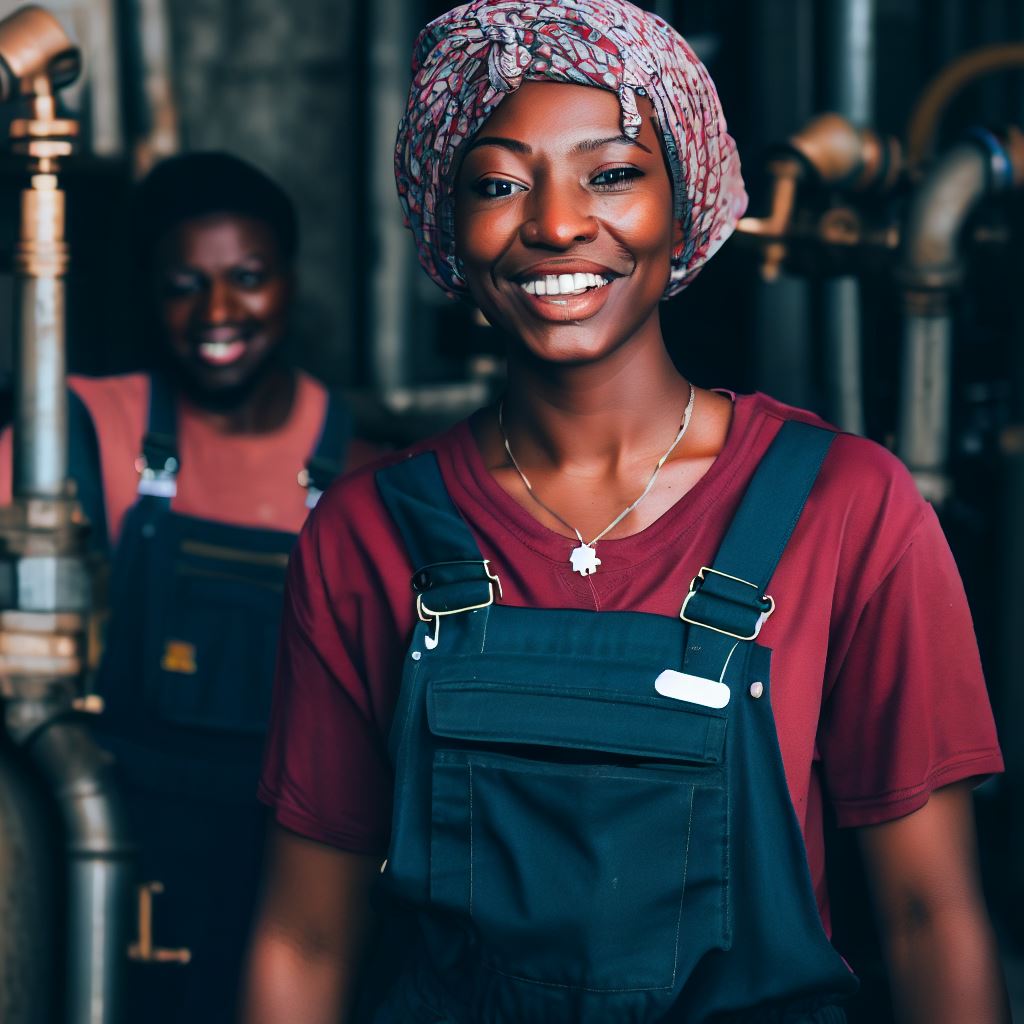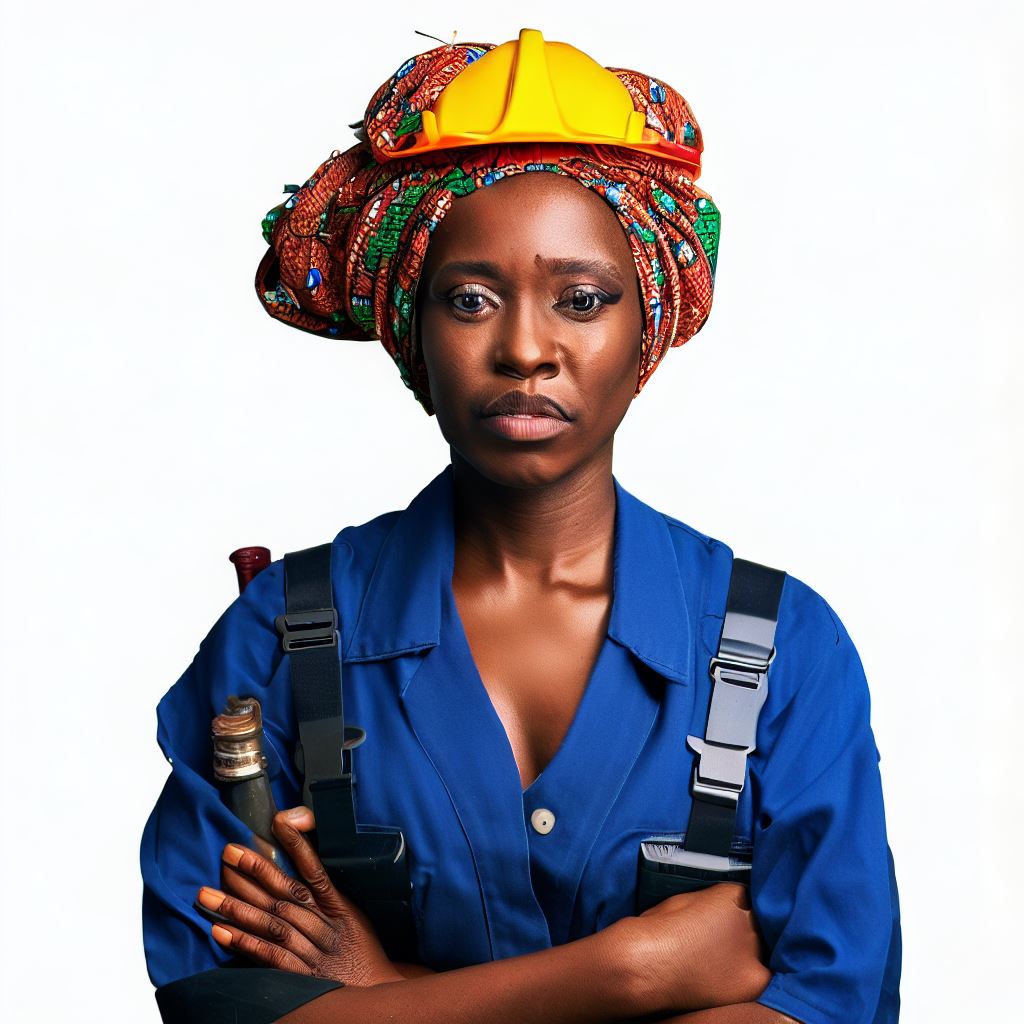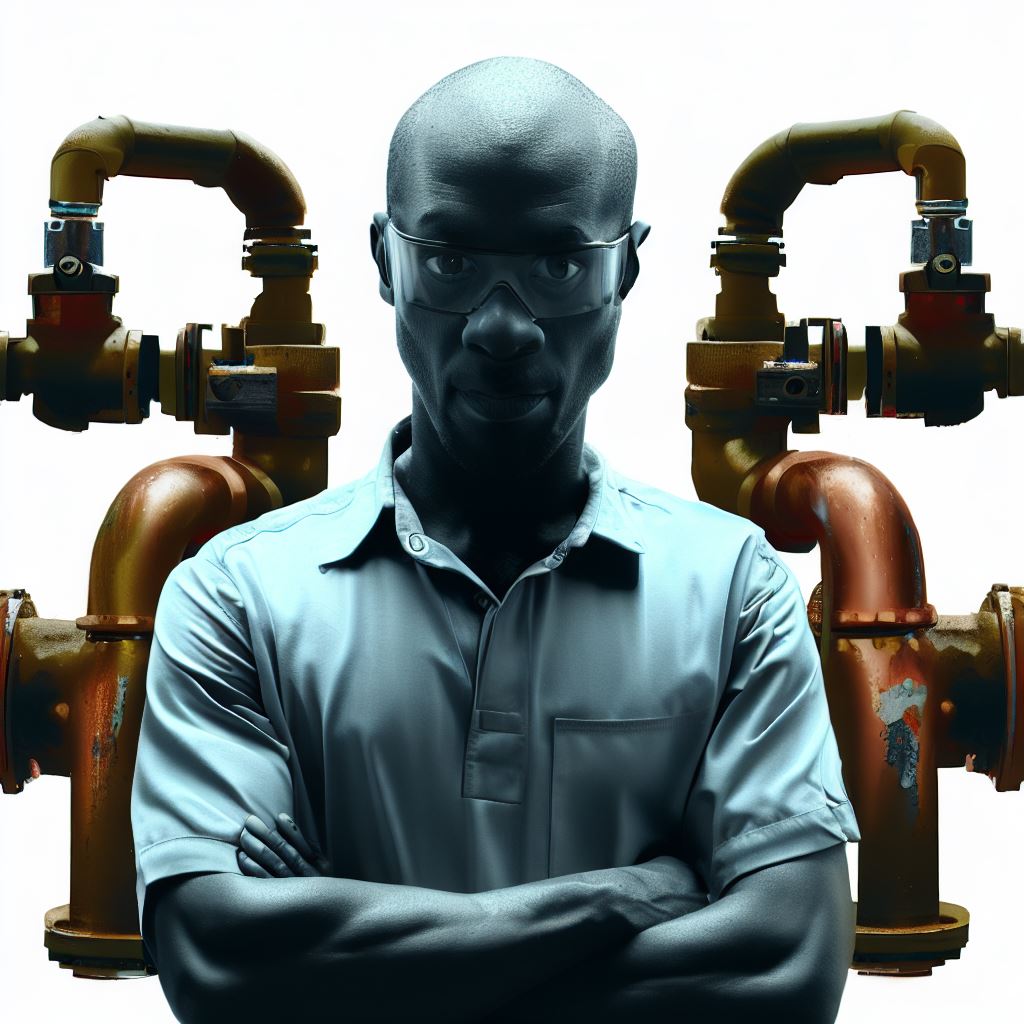Introduction
Let’s explore women in plumbing: Breaking barriers in Nigeria’s profession.
In Nigeria, the topic of women in plumbing has gained significant attention in recent years.
As more and more women enter this traditionally male-dominated field, it is important to recognize and celebrate their contributions.
Breaking gender barriers in professions such as plumbing not only empowers women, but also promotes diversity and equality in society.
This blog post aims to shed light on the experiences and challenges faced by women in the plumbing industry in Nigeria.
It will explore the reasons behind the underrepresentation of women in this profession and the importance of encouraging more women to join.
Additionally, we will discuss the achievements and success stories of women who have already made a mark in plumbing.
Through this blog post, we hope to inspire and motivate aspiring women plumbers by sharing the stories of those who have paved the way.
We will also address the need for supportive policies and initiatives to create a more inclusive work environment for women in the plumbing sector.
By highlighting the barriers faced by women in plumbing and emphasizing the benefits of a diverse workforce, we aim to encourage societal change and break down traditional gender norms.
Women have a rightful place in the plumbing profession, and it is time to challenge stereotypes and create equal opportunities for all.
Historical Overview of Plumbing in Nigeria
Plumbing has been an essential part of human civilization, dating back to ancient times.
In Nigeria, plumbing practices can be traced back to the pre-colonial era.
Traditional plumbing techniques focused on basic water supply and sanitation systems.
As the country developed, plumbing evolved to include modern technologies and infrastructure.
Transform Your Career in Nigeria
Discover unmatched expertise with our personalized Career Consulting service. Navigate Nigeria’s job market with a strategy tailored just for you.
Get StartedTraditional Views on Gender Roles in Nigeria
Nigeria has a patriarchal society where gender roles are deeply ingrained.
Traditional views emphasize that women should focus on domestic chores and child-rearing.
Men are often expected to be the primary breadwinners, while women are confined to household responsibilities.
These gender roles have limited women’s opportunities to pursue careers in male-dominated fields, including plumbing.
How Plumbing Has Traditionally Been Considered a Male-Dominated Profession
Plumbing has historically been perceived as physically demanding and suitable only for men.
The perception of plumbing as a dirty and labor-intensive job has deterred women from entering the profession.
Cultural beliefs and stereotypes have reinforced the notion that women are not capable of handling plumbing work.
This societal bias has resulted in a significant gender gap within the plumbing industry in Nigeria.
Notable Women Who Have Made Strides in This Field in the Past
Despite the challenges, some notable women in Nigeria have broken barriers and excelled in the plumbing profession.
Mrs. Elizabeth Arewa’s remarkable achievements in plumbing have made her a pioneer in the industry.
She succeeded in establishing her own plumbing company and contributed to the training of female plumbers.
Another notable woman, Mrs. Funmilayo Ogunmilade, became the first female plumber in her region.
Both women’s dedication and expertise have paved the way for other women to enter and thrive in plumbing.
In short, plumbing in Nigeria has a rich history dating back to ancient times.
However, traditional views on gender roles have limited women’s inclusion in this male-dominated profession.
Despite these barriers, women like Mrs. Elizabeth Arewa and Mrs. Funmilayo Ogunmilade have made significant strides in the field, inspiring other women to follow their footsteps.
There is still considerable work to be done to challenge societal norms and increase gender diversity in plumbing, but the progress made by these pioneering women is an encouraging sign for future generations.
Read: Entrepreneurship in Plumbing: Starting a Business in Nigeria
Emerging Trends: Women in Plumbing
How attitudes towards women in plumbing have started to change in Nigeria
In Nigeria, attitudes towards women in plumbing have started to change significantly over the past decade.
Gone are the days when plumbing was considered a strictly male-dominated profession, and women were discouraged from pursuing it.
Today, more and more women are breaking barriers and entering the plumbing industry, proving that gender should never limit one’s career choices.
Success stories of women who have entered and excelled in the plumbing profession
One of the success stories is Ada Udechukwu, a trailblazer in the plumbing profession.
She defied societal expectations and pursued her passion for plumbing.
Despite facing initial skepticism and bias, her dedication and skills allowed her to excel in her career.
Publish Your Professional Profile, Business or Brand
Showcase your expertise, gain trust, and boost visibility instantly on Professions.ng.
Publish NowAda’s journey has inspired countless other women to join the plumbing profession and establish themselves as experts in their field.
Another remarkable example is Amina Aliyu, who has become a role model for aspiring female plumbers.
Through her determination and hard work, Amina has not only achieved success but also established her own plumbing company, employing and empowering other women.
These success stories not only demonstrate the individual achievements of women in plumbing but also highlight the industry’s potential for empowering women and promoting gender equality.
Impact of increased awareness on gender equality and empowerment
The increased awareness of gender equality and empowerment has been a driving force behind the changing attitudes towards women in plumbing.
As more organizations and individuals recognize the importance of diversity and inclusion, efforts have been made to encourage and support women in traditionally male-dominated professions.
Plumbing associations, vocational schools, and non-profit organizations have launched programs and initiatives aimed at providing training, mentorship, and job opportunities for women interested in plumbing.
The impact of these changes is far-reaching and extends beyond just the individuals involved.
By breaking barriers and becoming successful in plumbing, women are challenging traditional gender roles and inspiring young girls to think beyond societal expectations.
They are paving the way for a future generation of female plumbers, where the profession is no longer limited by gender stereotypes.
Furthermore, the inclusion of women in plumbing brings a diverse perspective to the industry, leading to innovation and improved problem-solving.
Women have proven themselves to be just as capable and skilled as their male counterparts, and their presence in the plumbing profession contributes to its overall growth and success.
In fact, the emergence of women in plumbing is a positive trend that demonstrates the changing attitudes towards gender in Nigeria.
Through the success stories of women like Ada Udechukwu and Amina Aliyu, it is evident that women can excel in traditionally male-dominated professions, such as plumbing.
Increased awareness and support for gender equality have played a significant role in encouraging more women to pursue careers in plumbing.
With each barrier broken and success achieved, women in plumbing are not only transforming their own lives but also reshaping the perception of the profession as a whole.
Read: Plumbing Challenges in Nigeria: An In-Depth Analysis
Challenges Faced by Women in Plumbing
When it comes to pursuing a career in plumbing, women often encounter various obstacles that hinder their progress and discourage their participation in the profession.
Various obstacles women encounter in pursuing a career in plumbing
These challenges are rooted in societal biases, stereotypes, discrimination, lack of support, and limited opportunities.
Key Challenges for Women in Plumbing:
Lack of Representation
There is a lack of representation of women in the plumbing industry, making it difficult for aspiring female plumbers to find role models or mentors.
Seeing few women in the field may lead to feelings of isolation and discourage women from pursuing plumbing as a career choice.
Stereotypes and Biases
Stereotypes portray plumbing as a male-dominated profession, reinforcing the belief that women are better suited for traditionally “feminine” roles.
Biases against women in plumbing can include assumptions that they lack the physical strength or technical skills required for the job.
Discrimination
Women in plumbing often face discrimination in the form of unequal pay, limited career advancement, and being subjected to harassment or sexist treatment.
Some clients or employers may be hesitant to hire female plumbers due to biased perceptions, adding to the difficulties faced by women in establishing themselves in the field.
Lack of Support
Women pursuing a career in plumbing may lack the necessary support from their families, friends, or educational institutions.
The absence of guidance and encouragement can make it more challenging for women to enter and thrive in the industry.
Limited Opportunities
In some cases, women may struggle to access the same employment and business opportunities as their male counterparts.
Limited access for women to training, apprenticeships, and networking hinders skill development.
Breaking the Barriers
Despite these challenges, women in Nigeria’s plumbing profession are breaking barriers and making significant contributions to the industry.
Here are some ways to address and overcome the obstacles faced by women in plumbing:
Increasing Awareness and Representation
Creating awareness about the presence and success of women plumbers through media campaigns and showcasing their achievements can inspire others.
Establishing mentorship programs and support networks for women in plumbing can provide guidance and encouragement.
Challenging Stereotypes and Biases
Education and awareness campaigns can challenge the stereotypes and biases that discourage women from entering the plumbing profession.
Showcasing the diverse skills and expertise of women in plumbing can help debunk misconceptions and inspire more women to pursue the career.
Promoting Equal Opportunities and Inclusion
Advocating for equal pay, fair treatment, and better working conditions for women plumbers is essential for creating a more inclusive industry.
Employers should actively recruit and hire women plumbers, providing them with the same opportunities for career advancement and training.
Building Strong Support Systems
Providing scholarships, grants, and financial assistance to women pursuing plumbing education can help break financial barriers.
Establishing support programs that foster networking, mentorship, and guidance can help women overcome the lack of support they often face.
Publish Your Professional Profile, Business or Brand
Showcase your expertise, gain trust, and boost visibility instantly on Professions.ng.
Publish NowEncouraging Girls in STEM
Starting at a young age, promoting the involvement of girls in science, technology, engineering, and mathematics (STEM) subjects can lay the foundation for future careers in plumbing.
By challenging gender stereotypes in education, we can encourage more girls to consider plumbing as a viable and rewarding profession.
Breaking the barriers that hinder women in plumbing is crucial for creating a more diverse, inclusive, and thriving profession in Nigeria.
By addressing the challenges head-on and implementing supportive measures, we can empower women to succeed and make their mark in the plumbing industry.
Read: Local Plumbing Codes in Nigeria: An Essential Reference Guide

Overcoming Barriers: Empowering Women in Plumbing
When it comes to the plumbing industry in Nigeria, women have long been underrepresented.
However, over the past few years, there has been a push to break down barriers and empower women in this profession.
Initiatives and organizations have emerged to promote inclusion and provide opportunities for women to thrive in plumbing.
Initiatives and Organizations Promoting Inclusion
Several initiatives and organizations have been instrumental in advocating for the inclusion of women in the plumbing industry.
- Women in Plumbing Initiative (WPI): This organization aims to address the gender gap by providing mentorship, support, and resources for women aspiring to become plumbers.
- Plumbing Women Society (PWS): PWS focuses on promoting gender equality and empowering women already working in the plumbing industry through networking events and professional development opportunities.
- Skills Training and Empowerment Program (STEP): STEP offers vocational training programs specifically designed for women interested in pursuing plumbing as a career, equipping them with the necessary skills and knowledge.
The Importance of Mentoring, Education, and Skills Training
Mentoring, education, and skills training are crucial factors in empowering women who aspire to be plumbers.
- Mentoring: Having experienced and successful women plumbers as mentors can provide guidance and inspiration, helping aspiring plumbers navigate the challenges they may face.
- Education: Access to quality education is fundamental in developing the technical knowledge and understanding required in the plumbing industry.
- Skills Training: Practical skills training programs enable women to gain hands-on experience, which is essential for success in the plumbing profession.
Success Stories in the Plumbing Industry
Despite the barriers, numerous women have defied the odds and achieved success in the plumbing industry.
- Aisha Abdullahi: Aisha started as an apprentice and eventually became the first female plumber to run her own successful plumbing company in Lagos.
- Nkechi Okoro: Nkechi, through determination and hard work, overcame societal expectations and established herself as a respected plumber, breaking gender stereotypes.
- Grace Ojo: As a pioneer in the plumbing industry, Grace has set an example for aspiring women plumbers by excelling in her work and advocating for more opportunities for women in the field.
These success stories inspire and pave the way for other women to pursue their dreams in plumbing.
In essence, the plumbing industry in Nigeria has been historically male-dominated.
However, with the efforts of various initiatives and organizations, women are gradually breaking down barriers and making their mark in this profession.
Through mentoring, education, and skills training, women are becoming empowered to pursue successful careers in plumbing.
The inspiring success stories of women who have overcome adversity in the industry serve as motivation for others.
It is essential to continue promoting inclusion and providing opportunities for women in plumbing, ultimately achieving gender parity and diversity within the profession.
Read: The Role of Plumbers in Nigeria’s Water Conservation Efforts
Future Outlook: Breaking Gender Barriers
Potential impact and benefits of having more women in the plumbing profession
Increased diversity in the plumbing profession can lead to a range of perspectives and ideas.
Having more women in plumbing can challenge existing stereotypes and promote gender equality.
Women can bring unique skills, such as attention to detail and excellent problem-solving abilities.
Increased representation of women in plumbing can inspire younger generations of girls to pursue non-traditional careers.
Women in plumbing can provide role models and mentors for other women entering the profession.
The changing attitudes towards gender roles and the growing demand for diversity in the workplace
Gender roles are no longer confined to traditional ideas, as society becomes more inclusive.
Workplaces are recognizing the value of diverse perspectives and the benefits they bring.
The demand for gender diversity in traditionally male-dominated fields, like plumbing, is gaining momentum.
Employers are realizing that a diverse workforce can lead to increased productivity and innovation.
Breaking gender barriers in plumbing reflects broader societal progress towards gender equality.
Potential steps to further promote gender equality and empowerment in the plumbing industry
- Advocacy for equal opportunities in education and training programs for women interested in plumbing.
- Development of mentorship programs that connect aspiring female plumbers with experienced professionals.
- Collaboration with local communities and organizations to raise awareness about the importance of gender diversity.
- Implementation of workplace policies that promote an inclusive and supportive environment for all employees.
- Support for women-owned plumbing businesses and initiatives to encourage entrepreneurship in the field.
In brief, the future outlook for women in plumbing is promising.
Increasing gender diversity in this profession can have far-reaching positive effects.
It challenges stereotypes, promotes equal opportunities, and brings valuable skills and perspectives.
As attitudes towards gender roles continue to change, more and more people recognize the need for diversity in the workplace.
To further promote gender equality and empowerment in the plumbing industry, various steps can be taken, such as advocacy, mentorship programs, and inclusive workplace policies.
By embracing gender diversity, the plumbing profession can create a more inclusive and empowering environment for all.
Conclusion
After exploring the experiences and challenges of women in the plumbing field in Nigeria, it is evident that breaking gender barriers is crucial for the profession to thrive.
Throughout this blog post, we have seen that women have faced discriminatory attitudes and limited opportunities in the plumbing industry.
However, their determination and resilience have allowed them to make significant strides.
It is vital to recognize the importance of breaking gender barriers in professions, specifically in plumbing in Nigeria.
By embracing gender equality, we create a more inclusive and diverse workforce.
We must encourage women to pursue their passion in the plumbing field and inspire others to support gender equality in all professions.
Publish Your Professional Profile, Business or Brand
Showcase your expertise, gain trust, and boost visibility instantly on Professions.ng.
Publish NowBy doing so, we empower women to thrive in traditionally male-dominated industries.
Women bring unique perspectives, skills, and contributions to the plumbing industry that benefit individuals, communities, and the economy as a whole.
It is crucial that we continue to support and uplift women in this field.
The journey of women in plumbing in Nigeria showcases the significance of breaking gender barriers.
It is essential to create equal opportunities, celebrate diversity, and empower women to pursue their dreams. Together, we can build a more inclusive and equitable society for all.




